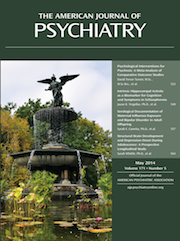T
o the E
ditor: In the January issue of the
Journal, Wang et al. (
1) reported more upper gastrointestinal bleeding risk in patients taking the combination of selective serotonin reuptake inhibitors (SSRIs) and nonsteroidal anti-inflammatory drugs (NSAIDs) than SSRIs combined with aspirin (adjusted odds ratios, 3.44 compared with 2.07). However, the data from the previous study by Dall et al. in 2009 (
2) revealed that the stratum-specific odds ratio of upper gastrointestinal bleeding when combining SSRIs with NSAIDs or aspirin was the opposite (adjusted odds ratios, 1.79 compared with 2.2).
We tried to explain the different findings in two ways. First, Wang et al. analyzed the data from the Taiwan National Health Insurance Research Database, and differences in the prescription pattern and dosage must be taken into consideration. In Taiwan, aspirin is usually prescribed for the prevention of cardiovascular or cerebral vascular disease, and the recommended dosage according to the guidelines for these indications was relatively low (
3). On the other hand, NSAIDs were prescribed mostly for pain control, and dosage is adjustable with greater variations. The dosage and use pattern in Taiwan of aspirin and NSAIDs is different from Western countries. Data regarding the use of both over-the-counter drugs are not included in the National Health Insurance Research Database either. With confounding factors such as dosage and over-the-counter use without a prescription, we must be more careful when interpreting results.
Second, from the pharmacological point of view, common coadministration, such as with clopidogrel, should be taken into consideration. SSRIs elevated the risk of abnormal upper gastrointestinal bleeding through two mechanisms: antiplatelet activity and increased gastric acidity. But the interaction of SSRI and cytochrome P450 enzyme should also be considered. Clopidogrel is commonly prescribed with aspirin for cardioprotection, and it needs bioactivation mediated by CYP2C19 to achieve the antiplatelet efficacy. Coadministration of CYP2C19-inhibiting drugs reduces the efficacy of clopidogrel. CYP2C is inhibited by fluoxetine, sertraline, and fluvoxamine. With concomitant clopidogrel, aspirin, and CYP2C19-inhibiting SSRI use, the interpretation that aspirin is associated with less upper gastrointestinal bleeding than NSAIDs becomes unclear. Large doses of aspirin inhibit platelet aggregation and vascular synthesis of the prostaglandin I2 (PGI2). PGI2 inhibits platelet aggregation and thus low-dose aspirin is more known for increasing upper gastrointestinal bleeding than large-dose aspirin (
4). When considering NSAID- and aspirin-related gastrointestinal bleeding, clinicians should take aspirin dosage and other combined medication into account.
Clinicians should be very cautious about upper gastrointestinal bleeding when prescribing SSRIs, especially when in combination with other medications. More research is needed to elucidate whether NSAIDs or aspirin is safer when combining with SSRIs, with consideration for dosage and prescription patterns.

